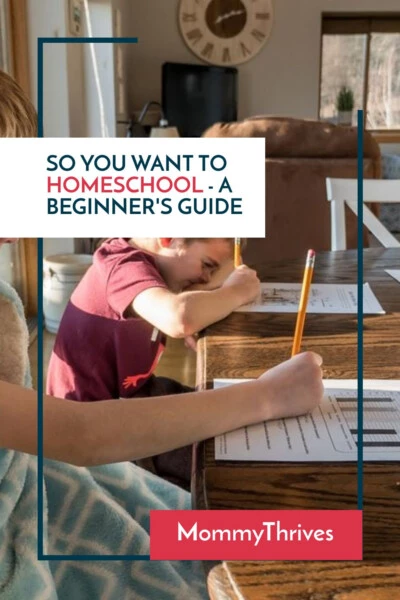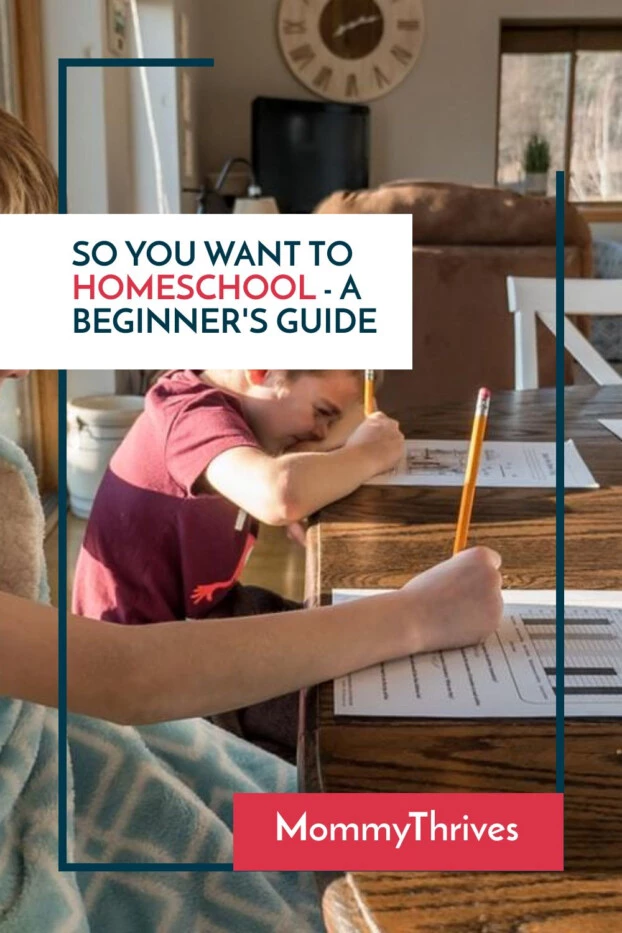I spend a bit of time on social media and there is one thing I am seeing a lot of in recent weeks. There are a lot of parents who are making the decision to homeschool their child this year because things are not working out at the schools. I decided to write a guide for beginner homeschoolers in order to make sure you start your homeschooling experience out right.
There are numerous reasons why parents are deciding to give up public schools and start homeschooling their kids this year, even if it’s temporary:
- The schools keep sending kids home to isolate because of exposure.
- The schools don’t have enough teachers or staff because of covid.
- States are pushing in school classes and railing against mask mandates.
- Kids under 12 can’t get vaccinated.
- The schools are switching between virtual and in class so much it’s making heads spin.
All of these reasons are valid right now and all of them can cause kids to fall behind in their classes. Kids can often thrive in structure and sticking to a schedule. This school year is shaping up to be a mess, and we are only a couple weeks in.
Now, I’m a homeschool mom. I decided long before the pandemic that I would be homeschooling my child for a whole host of reasons. Let’s just say the pandemic really drove home the importance of homeschooling for me and my family.
As I keep seeing videos and posts from parents who are pulling their kids out of school to homeschool they are all asking for the same things. “How do I do it? What do I need to get? Any advice would be appreciated.”
So I’m listing out my top pieces of advice that beginner homeschoolers need to know as well as different homeschooling methods to look into to make your homeschooling journey the best it can be.
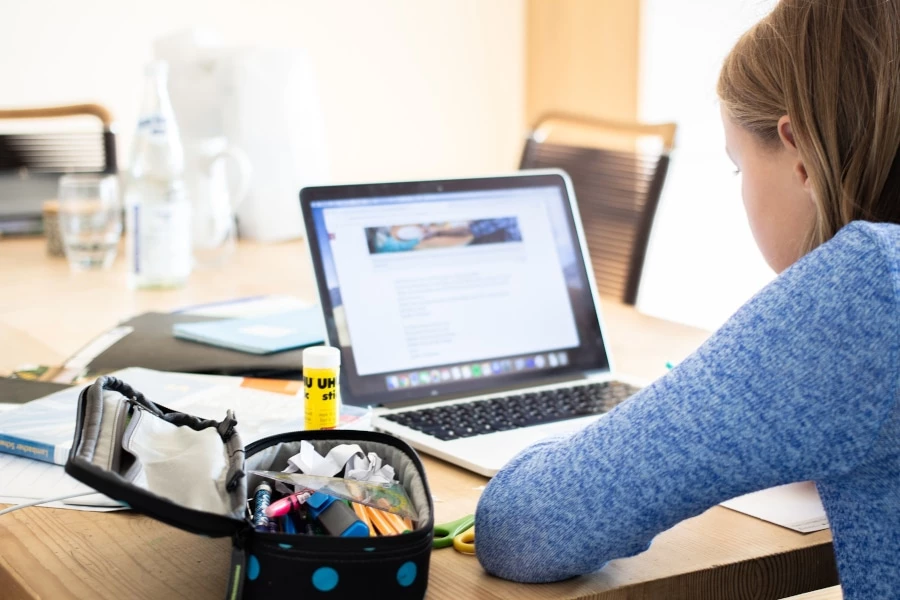
The Laws Beginner Homeschoolers Need To Know
First, let’s get your legal ducks in a row. Homeschooling is not typically as easy as informing your school and getting your curriculum. There are some legal issues that you will need to take care of right off the bat.
Visit Home School Legal Defense Association to find out what your specific state laws are and what you need to do to officially start your homeschooling.
Some state’s requirements and regulations are super easy laws like Illinois that basically just wants you to keep track but there is no reporting necessary – though I recommend reporting to the school that you are homeschooling if you are pulling a kid from their school.
Some states have pretty intense laws on homeschooling, like Pennsylvania – where I currently am. This state requires a few different forms, assurances of vaccines and medical information, curriculum outline, just to start the year. Then at the end of the year you need to have your child’s work reviewed by an approved evaluator and send it off to your schools superintendent.
States can sometimes think that they can bully parents into not homeschooling their kids. HSLDA has loads of forms and advice for exactly what the law says in your state and how you can handle situations that might come up with your state.
I also recommend looking up homeschooling blogs in your state. Simply Google “Homeschooling In (insert your state here.)” This will give you blogs that focus on your state and give practical advice for understanding your state’s laws according to what actual homeschoolers have gone through.
I highly recommend signing up with the HSLDA because it is one of the best homeschool resources I have seen. Plus it’s a pretty well known association and the membership includes all sorts of legal help with your state’s homeschool laws if you need it.
Beginner Homeschoolers Should Keep Plenty Of Records
The second tip beginner homeschoolers should know is to keep records of what you and your child studied throughout the school year.
Keep plenty of records about what your kid is learning, what assignments they’ve done, and how long it took. You can use a planner for this, create a spreadsheet, use a schooling bullet journal, or just mark things down in the curriculum you use.
Even in Illinois where the homeschool laws are pretty low regulation they may still want to see what you are doing with your child in schooling. Keeping accurate records of all of the work you are doing will help to prove that you are providing the state mandated academics.
Keep worksheets, assignments, and anything your child did for education throughout the year. I recommend having a specific tote to keep all of the worksheets and assignments. While some states are cool with just a journal or a spreadsheet, some states want examples of the work your kid has done.
Most people recommend keeping this information for 3 years. I’m going to say keep it through until they are an adult and finish college. It might be a little overkill, but if you have the records nothing can ever be claimed by anyone ever. Put everything in one tote in a safe place and you will likely be ok.
Picking a Homeschool Method as Beginner Homeschoolers
Beginner homeschoolers may find it a bit overwhelming to pick out a curriculum or a homeschool method for their kids. I’m going through the different types of homeschool methods so you can pick the right ones for your kid.
Traditional Homeschooling
Traditional Homeschooling typically uses a planned out homeschool curriculum. These curriculums follow the same type of structure that your kid would receive in a traditional school. This is usually the route most beginner homeschoolers go at first, and over that first year of homeschooling you adjust according to your child’s needs.
Some school boards or states will have curriculum outlines on their websites so parents can understand what their child is learning in that school year. You can use these as a basis for picking out a curriculum that will keep your kid on track with their peers.
Let me make something very clear about picking your curriculum though. Every child learns differently and it’s best to pick a curriculum that will suit their learning style.
Road or Worldschooling
This method of homeschooling is great for a traveling family. A lot of travel bloggers will use this method of homeschooling for their kids. They teach their kids through experience while traveling. They may follow a curriculum or plan their own based around their travels.
Unschooling
Unschooling is gaining a lot of popularity among homeschoolers. Unschooling is taking the traditional schooling method and throwing it in the trash for a more real life approach to schooling.
Instead of just reading about our nations history unschoolers get the chance to experience it, through field trips. Instead of doing random math problems the unschooler solves math problems through shopping, baking, cooking, planning out a homestead or garden, or creating a real life budget plan for the family.
Unschooling takes real life situations and turns them into real life education.
Waldorf Homeschooling
The Waldorf Homeschooling method is instilling an understand and appreciation of the child’s place in the global and natural world. Students learning with this method will spend a lot of time outdoors learning about the world around them and how they fit into it.
They also spend a lot of time in arts, music, and crafting giving the child an opportunity to find multiple hobbies and interests.
Homeschooling With A Theme or Unit Studies
My child loves penguins. If I were to use this homeschooling method every subject would have penguins as the main point of what my child is learning. History of penguin migration and the continents where penguins live. The Science behind how penguins survive. Reading material about penguins.
This allows your child to dive deep into their favorite subjects and study them till they are satisfied with everything they have learned about the one theme in multiple subject matters.
Then you find a new theme and go through it all again.
Eclectic Homeschooling
I personally embrace the eclectic homeschool option. This is where we mix a few different homeschool methods to reach a personalized method that works for us. This takes a deep understanding of your child and how they learn best.
If your child is old enough you may want to sit down and have an open conversation about how they best like to learn. Then make that way possible for them. They’ll learn faster, retain the information longer, and ultimately thrive in homeschooling.
This year I went with Oak Meadow for our 1st grade curriculum. We are a couple weeks in and I really like how they set it up. Oak Meadow is a great curriculum for kids with ADHD like mine who need to have time to hyper focus on what they really like, or move on to something more interesting.
In addition to the curriculum I am using YouTube, worksheets, documentaries, outdoor activities, field trips, and unschooling techniques to teach my son. He benifits from variety and flexibility in his homeschool education.
For beginner homeschoolers, I highly recommend using SecularHomeschooler. It’s FREE and they have gone through loads of different types of curriculum for different grades and in different subjects to find great secular options.
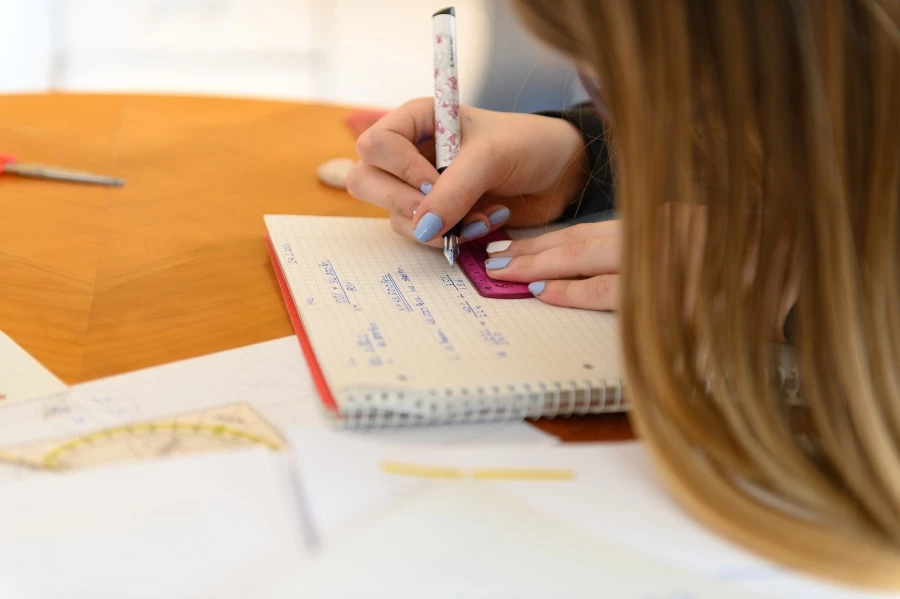
The Biggest Mistake Beginner Homeschoolers Make
The one mistake beginner homeschoolers make is over-scheduling for lessons. It is not going to take that long for your child or even your four children to learn the lessons of the day.
In a regular school you have one teacher who’s working with 20-30 kids. You are one person working with one to a few students. The time you spend on one thing will not take as long as it does in a classroom.
I’m telling you to lay off the regular class schedule as beginner homeschoolers because it will likely cause frustrations for your kids and you. Instead follow the curriculum and when your kid gets it incorporate that curriculum into your daily life for practice.
So if you have a first grader who’s starting matching, have them match socks from the laundry. If you have a middle school student learning about earth science, have them start a container garden or a garden in your back yard. Make the lesson a part of their life for practice, comprehension, and memorization, instead of grilling them with text book language for an hour each subject.
Everything Can Count As Educational
Beginner homeschoolers need to know that everything can count as educational. Going for a hike, gardening, cooking, baking, volunteering, and anything you can think of is educational and should be recorded in your homeschool record keeping.
You went on a hike and spotted a caterpillar crawling on the trail? Great, you learned about the lifecycle of a caterpillar or their shelter. You went to the zoo? You learned about different animals and what they eat.
You baked bread? Chemistry. You gardened? Life cycle of a plant from seed to vegetable. You cleaned the house? Health class. You cooked dinner? That’s just fire safety.
You should get my point by now. Giving your child life skills that they quite frankly aren’t likely to get in a traditional classroom is educational and a part of homeschool life and you should record all of these as a part of your homeschool curriculum.
Let Your Kids Lead The Way
One of the first lessons I learned was to let my kid take control of their learning, to a certain point. As beginner homeschoolers you will learn this lesson too. You have to figure out how your kid learns and use that to make school interesting for them.
My kid loves drawing and writing. He started writing well before he started actually talking. So now my job as the supervisor of his education is to find ways to incorporate everything he needs to learn into these two areas.
So for math, we learn via word problems. I ask him to write out a word problem that I tell him and then we work through the word problem to figure out if we should add, subtract, multiply, or divide. Later on this year we will use word problems to work through addition.
In science we are learning about the seasons, so I draw outlines of different seasonal objects and he gets to color them in. He learns about the objects, what season they belong in, and gets to be creative with his art.
Working with your child’s natural inclinations helps them to learn more while also keeping them happy in how they are learning.
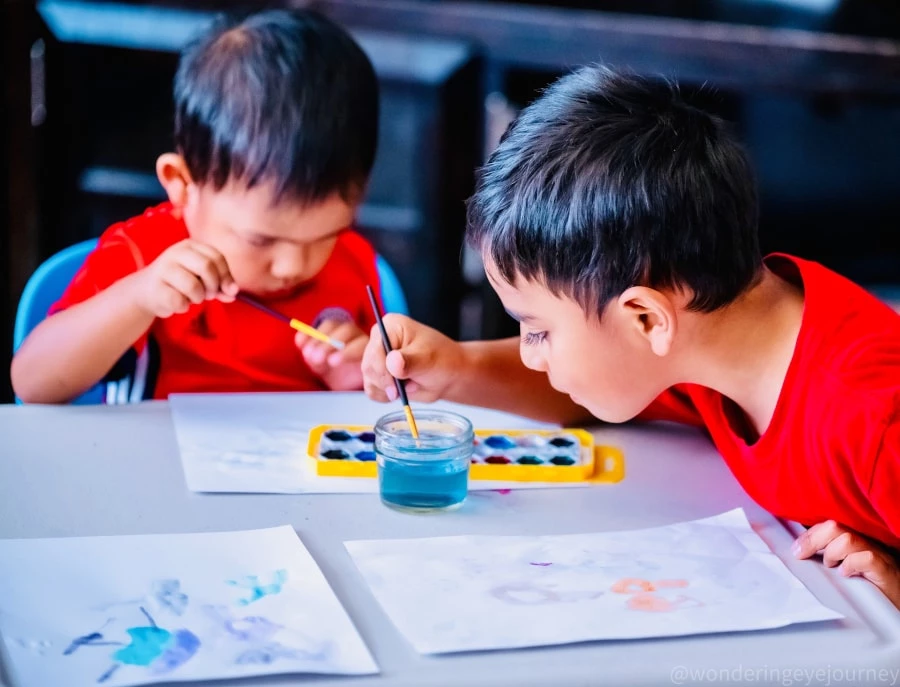
Beginners Homeschoolers Tips On Social Groups
Homeschooling can get lonely, for your kids and for you, which is why I’m including tips on how to add socialization to your homeschool method as beginner homeschoolers.
This one is a little difficult right now with the pandemic, however, I’d say it’s still necessary. Find a local homeschool group or two that are taking precautions, find local homeschool families who are super careful, or go to local events that have good guidelines to attend. You can find these using Google or even on Facebook.
First, as much as a homeschool group can be good for your kids, it’s also great for homeschooling parents. Homeschooling can get lonely for everyone and as a parent you will want to have connections with other homeschooling parents that will help you get through the hard parts of homeschooling.
There are ways to still be social during the pandemic that can still keep your family safe. It just takes a little extra work and research.
After the pandemic though, enroll your child in all sorts of extra curricular activities. Karate, dance, gymnastics, rock climbing, mountain biking, etc. All of these things will be fun activities your child can take part in while also building some necessary social skills that they need.
Temporary Or Continued Homeschooling
Finally, right now as beginner homeschoolers you might be thinking this is just temporary until things get better in the schools. I’m going to tell you to remove that assumption from your brain. You and your kids might learn to thrive in homeschooling and if that happens, you want to make sure they are getting the best experience they can.
Give it some time to get used to this, learn and work to make it the best it can be, and if you find your child is doing really well with homeschooling, don’t be afraid to continue it.
Furthermore, do yourself a favor and scrutinize the academics. You may find that your child isn’t learning exactly what happened in history, they may not be understanding how the actions of the past reflect what is happening today.
They may not be learning about computer science the way they can learn at home. Likewise, are they learning about real world functions like making a budget or what escrow is? What about how to keep a house or cook food for themselves?
After spending 6 hours or more at school are they really going to want to come home to learn about all that real world stuff? Or, can they learn what they need to learn in 4 hours at home and then spend an additional 2 learning real world survival before shutting down for the day to play Minecraft or Fortnite?
If your kid is doing well with homeschooling you might want to continue homeschooling through the remainder of their education. It could set them up for much larger success because instead of focusing on solely what the school wants them to do, they are set up to explore the subjects that inspire them more.
Beginner Homeschoolers
Homeschooling is not that difficult and if you have the ability to do so I recommend giving it a try while the schools are struggling to even stay afloat. It can save you and your family loads of headaches trying to keep track of when school is virtual or in person. Plus, it can keep your kid on a structured schedule that helps them to thrive.
For more blogs that focus a lot on helping beginner homeschoolers, check out this post here.
If you try it for a year while keeping your child and family safe, but you and your family decide it’s just not for you, hopefully next year will be better with the schools.
If you have any questions about homeschooling feel free to ask them in the comments below. Follow us on Pinterest for more like this and pin this to your favorite homeschooling boards.
